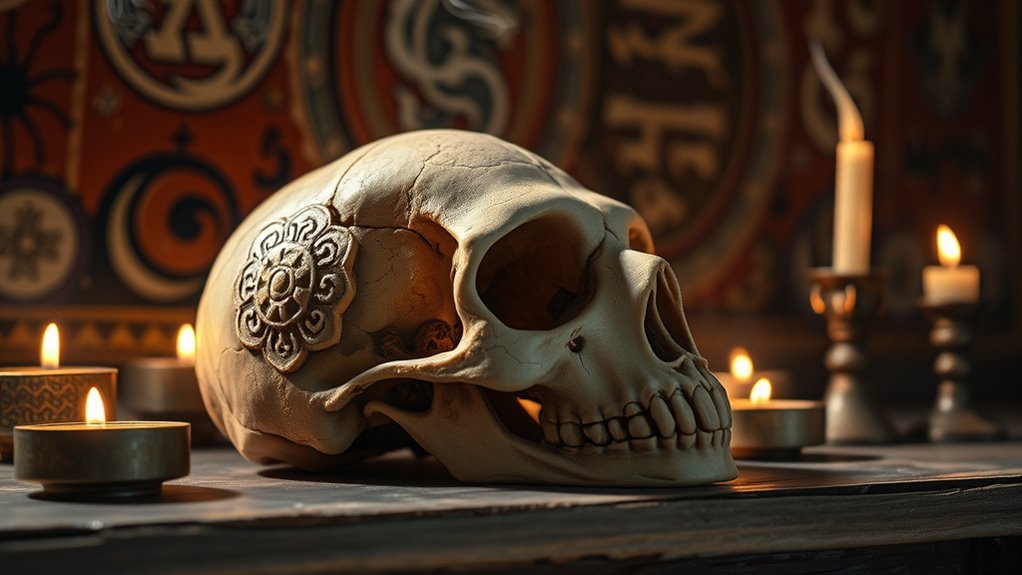12 Spiritual Meanings of a Skull
The skull serves as a powerful symbol of mortality. It carries various meanings in different cultures. It represents transformation, encourages self-reflection, and connects us to our ancestors. As you think about these interpretations, consider how they relate to your own life and beliefs. What insights can the skull offer about your experiences and changes? These revelations may shift your perspective and provide new understanding.
Key Takeaways
- The skull symbolizes transformation and the cyclical nature of life, emphasizing the importance of embracing change for spiritual growth.
- It serves as a reminder of mortality, inspiring reflection on life's fleeting nature and fostering empathy and connection.
- The skull represents wisdom and ancestral connection, encouraging exploration of heritage and honoring past experiences for personal growth.
- Through self-reflection, the skull aids in understanding one's identity and confronting personal challenges, promoting deeper emotional engagement.
- The shared lessons from the skull foster community, encouraging acceptance of inner fears and desires while guiding spiritual journeys.
The Skull as a Symbol of Transformation
The skull represents transformation in many cultures. It reminds us of mortality and the cycles of life and rebirth. Skulls symbolize letting go of the old self to embrace new beginnings.
Various traditions use skull imagery to show that change is important and sacred. Recognizing these diverse meanings helps us feel connected to the changes we all experience.
Embracing the skull as a symbol can build resilience, guiding us through life's transformations with strength and understanding.
A Representation of Mortality
The skull is a clear symbol of mortality. It's found in many cultures, reminding us of life's brief nature. This image encourages you to think about your existence. It sparks reflection and creates shared experiences within communities.
By considering mortality, you recognize life's fleeting moments. This recognition opens doors for connection and empathy with others.
In various traditions, the skull represents not just death but also the value of living fully. It serves as a reminder that life is valuable, urging you to appreciate each day.
When viewed this way, the skull shifts from a mere object to a symbol that joins people through their shared human experience. It fosters a sense of belonging, even amid life's uncertainties.
The Messenger of Change
The skull symbolizes change and transformation. It serves as a reminder that change is a natural part of life.
Here are four key aspects of change associated with the skull:
- Impermanence: It highlights the temporary nature of life, urging you to value each moment.
- Renewal: It marks the end of one stage and the start of a new one, promoting resilience.
- Awareness: It encourages reflection on your life and strengthens your connections with others.
- Courage: It motivates you to face changes bravely, enabling personal growth.
This symbol enriches your understanding of life's transitions and supports your journey of change.
Guardian of Wisdom
While thinking about the skull, you may see it as a strong symbol of wisdom in many cultures. It represents the journey of gaining knowledge through both happy and tough experiences.
Many cultures see the skull as a protector of knowledge. It offers guidance and support as you grow personally. Embrace this idea and let the skull's image inspire you to pursue wisdom actively.
Symbolizing Protection
The skull is a strong symbol of protection in many cultures. It represents the idea of guarding both the body and the spirit. Here are key points on how the skull symbolizes protection:
- Spiritual Protection: People often wear or display skulls to protect themselves from negative energies, creating a secure environment.
- Connection to Ancestors: The skull serves as a reminder of the wisdom from past generations, offering guidance and safety.
- Personal Strength: Embracing the skull can help you build confidence and resilience.
- Ritual Significance: Skulls are used in various ceremonies to invite protective energies, promoting community and togetherness.
Whether you wear a skull as jewelry or display it in your home, it can represent strength and safety in your life.
The Cycle of Life and Death
Skulls are strong symbols of life and death. They highlight the connection between being alive and facing mortality. Many cultures view skulls as representations of life cycles, showing that death isn't an end but a change.
Some cultures have death rituals where they use skull imagery to honor the deceased, creating a sense of community and shared beliefs. These traditions connect you with past generations and build a feeling of belonging.
Understanding this cycle helps you value life's beauty and fragility, linking your experiences with those who came before you. Ultimately, skulls encourage you to accept your mortality and turn fear into a deep appreciation for life's journey.
An Emblem of Courage
The image of a skull can symbolize courage. It connects with stories about bravery and the human spirit. Using a skull as a symbol can help you adopt a bold mindset and a fearless attitude.
Here are some ways this symbol can inspire you:
- Face Your Fears: A skull encourages you to confront your fears directly.
- Appreciate Life: It reminds you to value each moment and embrace existence fully.
- Gain Strength from Loss: Accepting mortality can build resilience and strengthen your willpower.
- Create Community: Discussing the skull symbol can unite people and foster a sense of belonging.
In these ways, the skull stands as a strong symbol of courage. It helps you tackle life's challenges with bravery and determination.
Connecting With Ancestry
Many people feel a strong connection to their ancestors through the skull symbol. This symbol encourages you to explore your family roots and value the legacy of those before you.
By thinking about the cultural importance of the skull, you discover stories, traditions, and wisdom that connect you to your heritage. Engaging with your ancestry can be a powerful experience. It helps you feel a sense of belonging and identity.
You can honor your ancestors by creating altars or participating in rituals. This allows you to celebrate their lives and the lessons they learned.
Embracing this symbol reminds you to appreciate your heritage and recognize the strength within your bloodline. You're part of a rich tapestry of life that connects generations.
The Mind-Body Connection
Understanding the mind-body connection shows how physical symbols, like the skull, can impact our thoughts and feelings. By looking into this connection, you can use symbols to improve your well-being and support your brain's ability to change.
Here are some simple ways to deepen your understanding:
- Practice mindfulness: Pay attention to your surroundings and the meaning of symbols.
- Reflect on personal experiences: Consider how symbols relate to your feelings.
- Build awareness: Observe how your thoughts and feelings show up in your body for stronger connections.
- Integrate beliefs: Balance outside symbols with your inner beliefs for complete healing.
Fostering this connection can enhance your sense of belonging and create a positive mental and emotional space.
Sign of Inner Strength
Skulls represent inner strength in many cultures. They symbolize resilience when facing life's challenges. Seeing a skull can remind you of your own ability to overcome difficulties.
Different cultures honor the skull's significance as a guardian of wisdom and a symbol of triumph over struggles. You're part of a varied community that shares these experiences. This connection encourages you to reflect on your journey and recognize your inner strength.
Embracing the skull's symbolism helps you appreciate your resilience and inspires others through your own story of overcoming obstacles.
Spiritual Awakening
Skulls represent spiritual awakening and resilience. Many cultures view skulls as symbols that can guide your spiritual journey and support personal growth.
Here are key meanings associated with skulls:
- Transformation – Skulls remind you that change is a natural part of life.
- Impermanence – They encourage you to appreciate each moment.
- Unity – Skulls symbolize the connection between all living beings and those who've passed away.
- Awareness – They foster mindfulness regarding your existence and conscious choices.
Embracing these ideas can help you understand life's mysteries better and create a sense of belonging in a spiritual community.
Skulls encourage exploration of your inner self and motivate you to walk your path with purpose.
Manifestation of the Inner Self
As you explore your inner self, understanding the role of symbols can help you on this journey. The skull is a symbol found in many cultures. It encourages you to face your inner truths.
It stands for self-discovery and reflection, inviting you to recognize your fears, desires, and your true essence. Engaging with this symbol can also strengthen your connection to your heritage while guiding you on your path.
Embracing the lessons of the skull helps you realize that your journey is personal, yet connected to others. Many people seek a meaningful existence.
Find strength in this shared quest for understanding and belonging. You aren't alone in this exploration.
Frequently Asked Questions
How Can I Incorporate Skull Symbolism Into My Daily Life?
You can show your style by wearing skull jewelry or placing skull decorations in your home. These items highlight individuality and connect you with others who share an appreciation for their meanings and cultural significance.
Are There Specific Cultures That Celebrate Skull Symbolism?
In Mexican culture, Dia de los Muertos celebrates skull symbolism to honor life and remember ancestors. During this time, people use colorful skull decorations and offer food and flowers to welcome back loved ones who have passed.
Buddhism also embraces skull symbolism. In this tradition, skulls represent impermanence. Practitioners acknowledge that life is temporary and that everything changes over time.
These different cultures show how skulls can symbolize both life and death, offering a unique perspective on existence and memory.
What Are Popular Designs for Skull Tattoos?
When you choose a skull tattoo, you can pick from traditional designs like Day of the Dead motifs or modern styles with unique details. Each tattoo represents different cultures, adding personal meaning and identity.
How Do Crystals and Skull Imagery Work Together Spiritually?
Combining crystal energies with skull imagery creates a strong spiritual balance. This blend encourages you to reflect on life and death. It helps you live fully while staying connected to shared beliefs and cultural stories. Embrace this combination to enhance your spiritual journey.
Can Skull Symbols Differ in Meaning by Location?
Skull symbols can have different meanings based on their location. Each culture interprets these symbols in its own way, reflecting unique views on life, death, and identity. This variation leads to a richer understanding of shared beliefs within communities. For example, in some cultures, a skull may symbolize death and danger, while in others, it represents protection or rebirth. These differences highlight the importance of cultural context. Understanding these interpretations can help people connect better with the values and traditions of different societies.

Liza Stockholm is an esteemed spiritual guide and the visionary behind Spiritual with Liza. With a profound passion for empowering others on their spiritual journey, Liza offers a blend of educational content and personal guidance. Her expertise in spirituality is rooted in years of dedicated practice and study, making her a trusted companion for those seeking enlightenment and inner peace.






